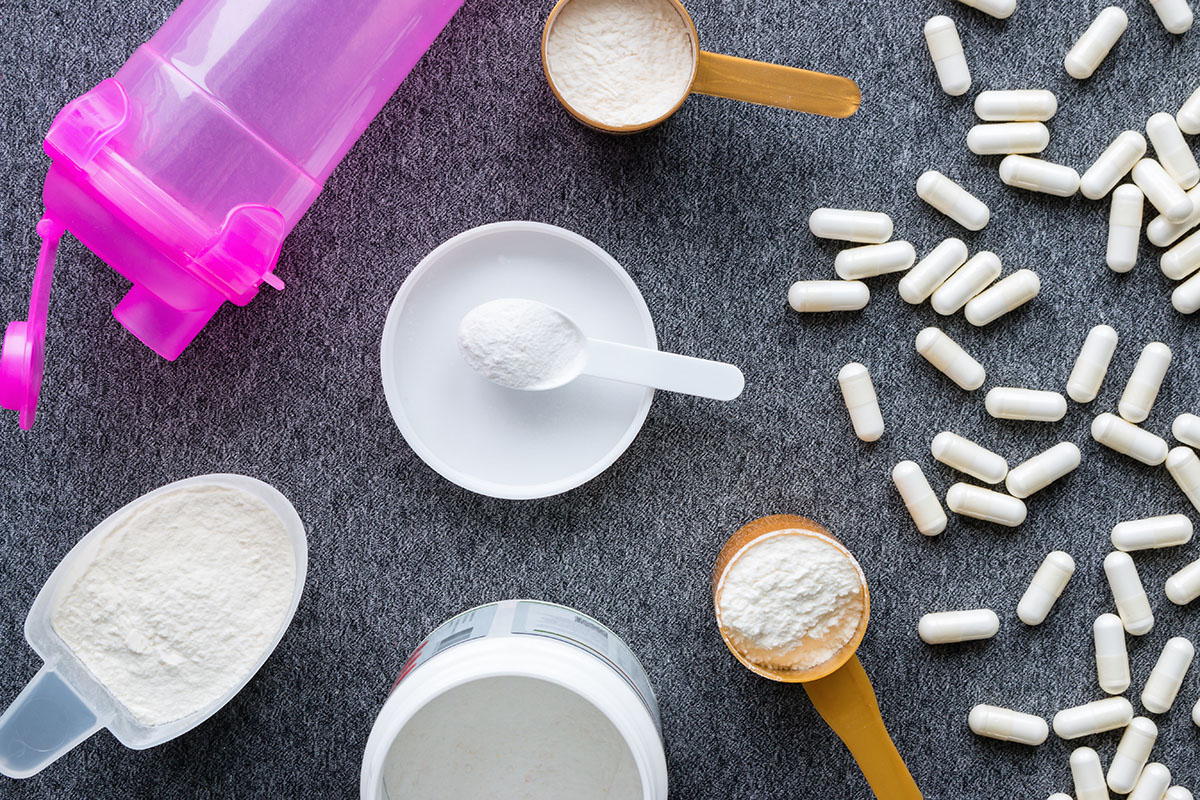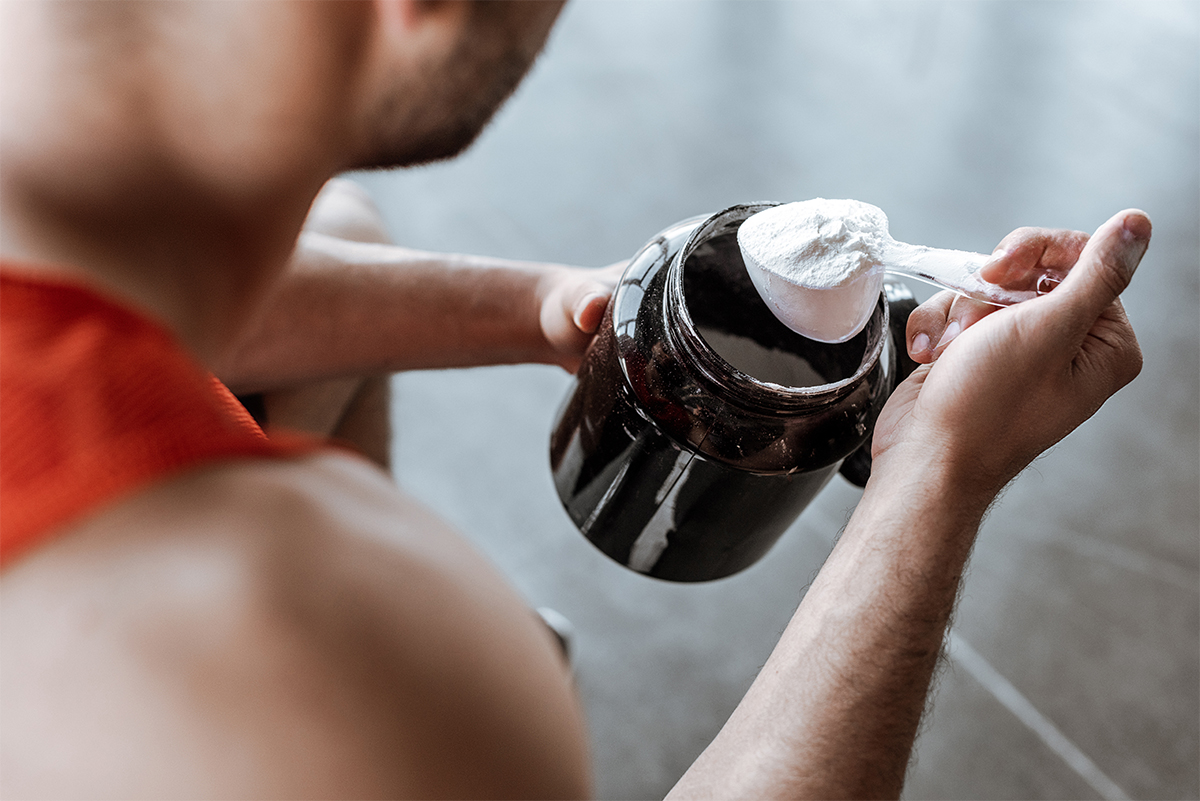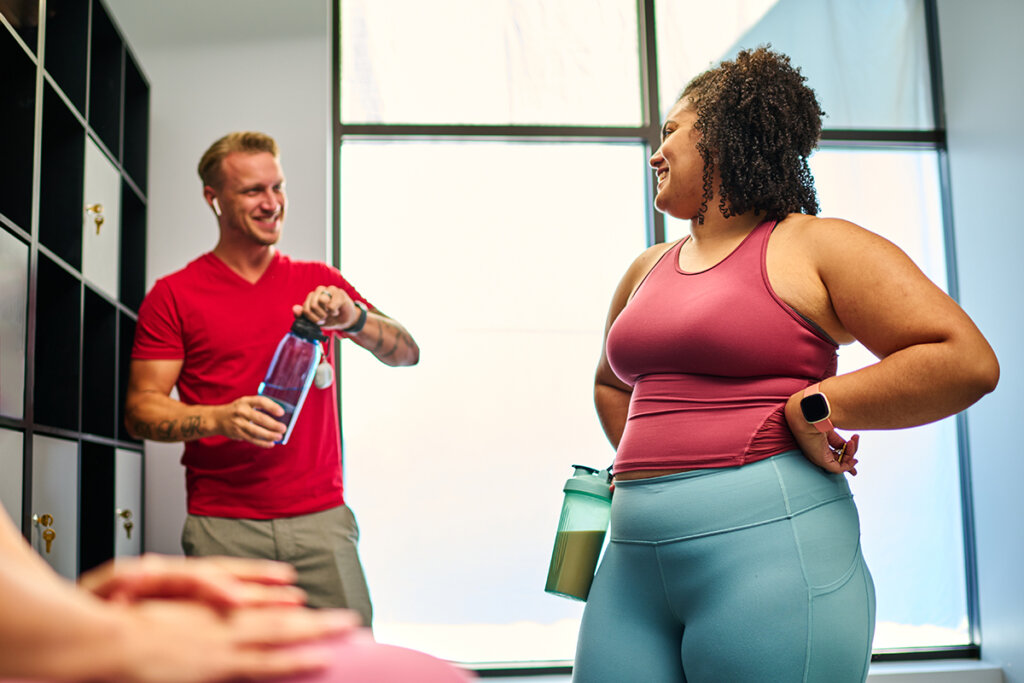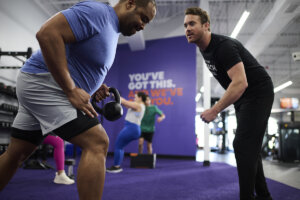Did you know that a pre-workout supplement can be a powerful tool for improving fitness results? Pre-workout can help you eke out more reps and ramp up your exercise intensity. It’s also a great way to kick your butt into gear on days when going to the gym feels harder than usual.
But what is pre-workout, exactly? Here, we’ll explain everything you need to know about using a pre-workout supplement, including:
- What is pre-workout?
- What does pre-workout do?
- How to take pre-workout
- Is it okay to take pre before every workout?
- What you should look for in a pre-workout
- Pre-workout risks and potential side effects
What is pre-workout?
So, what is pre-workout? “Pre-workout” refers to a dietary supplement with ingredients that boost your workout performance. Not only is it a tool for jumpstarting your workout, but pre-workout supplements can also give you the extra oomph to power through exercise with more reps and intensity.
Types of pre-workout supplements
There are two categories of pre-workout:
- Products with stimulants (“stim”): Stim pre-workout supplements contain caffeine or other stimulants that boost energy, which can help enhance performance.
- Products without stimulants (“non-stim”): Non-stim pre-workout supplements use ingredients like amino acids that provide similar benefits without the use of stimulants.
Pre-workout supplements come in a few forms, including:
- Powder (mixed with water to mimic the flavor of a sports drink)
- Gummies
- Capsules
Pre-workout vs. protein powder
Protein powder and pre-workout are both supplements that can help boost your energy and exercise performance. While pre-workout is generally intended for use before a workout, protein powder is intended for post-workout recovery, as it helps with muscle repair. Pre-workout supplements have ingredients that are focused on enhancing the training you’re about to do.

What does pre-workout do?
Now that you know what pre-workout is, let’s discuss what it does for your body.
Pre-workout supplements produce energy. The idea is that having more energy enables you to work out longer and harder. That could mean squeezing out a few more reps, going an extra mile, or picking up the pace. The more you rack up these next-level workouts, the speedier your fitness results.
Does pre-workout burn calories or fat?
Pre-workout on its own doesn’t affect weight loss or muscle growth. “No pre-workout supplements burn calories or fat for you,” says Stronger U Nutrition dietitian Sinan Ozyemisci, MS, RDN. “It’s just a tool to intensify the workout.”
How to take pre-workout
You may be wondering, “How much pre-workout should I take?” Your ideal dosage depends on the ingredients in your pre-workout supplement — it can range from a few milligrams to several grams per day. Read the nutrition label on your pre-workout for specific recommendations.
Next, you may wonder what to mix pre-workout with. If you’re using a powder supplement, simply mix your dose in water. If you’re taking a gummy or capsule, wash it down with a glass of H2O.
Another common question is: “Should I eat before taking pre-workout?” Taking pre-workout with food can help reduce some of the potential side effects, such as tingling or jitters.
The trick is to pair your pre-workout with foods that won’t disrupt your workout. “Immediately prior to, or very close before training or exercise, we do not want much solid food sitting in our stomach, which can prohibit maximal blood flow to working muscles and promote GI distress,” says Samuel Walker, MS, RDN, LDN, with Stronger U Nutrition.
Opt for a snack or small meal that includes simple carbohydrates and protein. The best pre-workout snacks include protein bars, bananas, fruit with Greek yogurt, smoothies, or almonds.
When to take pre-workout
As you may have guessed, pre-workout supplements are meant to be taken before exercise. But how long before a workout should you take pre-workout? Aim to take your supplement about 30 to 60 minutes before you start training.
How long does pre-workout last?
If you take the recommended amount of pre-workout for your body weight, you can expect the effects to last 3 to 6 hours — long enough to get through a serious workout!
Is it okay to take pre before every workout?
You can take a pre-workout once daily at most. However, you don’t really need it for yoga, Pilates, or low-intensity sessions. Save the pre-workout for endurance and high-intensity training.
What should you look for in a pre-workout?
The ingredients in pre-workout vary from product to product. Here are the ingredients to look for when shopping for a supplement.
A note of caution: Each product boasts a different combination of ingredients. It’s important to read supplement labels carefully before buying.
Caffeine
As a natural stimulant, caffeine is one of the most common pre-workout ingredients. It boosts your energy and focus and may blunt pain, helping you push through a workout.
The ideal dosage of caffeine for exercise performance is 3 to 6 milligrams per kilogram of body weight (that’s 300 mg for most people). However, the FDA says up to 400 milligrams of caffeine daily (two to three 12-fluid-ounce cups of coffee) is safe for most adults.
More caffeine isn’t always better. High amounts can make you jittery or irritable and make it tough to sleep if taken too close to bedtime. If you exercise later in the afternoon or evening or are sensitive to caffeine, you may want to try stimulant-free pre-workouts.
Creatine
There’s a reason creatine monohydrate is one of the most-used supplements in the world. It’s used to make adenosine triphosphate (ATP), the energy that powers your every move. Creatine is also a naturally occurring substance found in muscle cells.
Studies show that supplementing the creatine in your body can help build muscle. It does this by accelerating the production of muscle cells during a strength-training or high-intensity workout. More muscle cells build muscle mass and stronger muscles allow for harder workouts.
Amino acids
Your body has 20 amino acids that make up thousands of different proteins. Nine of those 20 are considered essential amino acids, meaning they can’t be made by the body and must come from your diet.
Of those nine essential amino acids, three fall under the category of branched-chain amino acids (BCAAs):
BCAAs are unique. They boost protein production while minimizing breakdown. Simply put, BCAAs help to build muscles and can limit soreness, making them a potent pre-workout ingredient. With stronger, refreshed muscles, you can train longer and more often.
There are a few other amino acids you might find in a pre-workout:
- Beta-alanine: You know that burning feeling you get when you’re pushing through your last few reps and maxing your muscles out to their limit? Beta-alanine can make that sensation more bearable — and help you push through it. Beta-alanine is generally safe but it can trigger an odd tingling sensation in some people. If that happens, take smaller amounts.
- L-tyrosine: L-tyrosine helps create adrenaline and norepinephrine, two hormones that activate when you’re stressed — or pushing through a difficult workout. And, because of its relationship with those two hormones, studies have shown that l-tyrosine can help improve exercise performance when you’re under stress.
- L-theanine: If you prefer a pre-workout that doesn’t contain caffeine, look for L-theanine. This natural ingredient found in tea has been shown to improve focus, attention, and alertness.
- Acetyl l-carnitine: Acetyl l-carnitine helps your body convert fat into energy. So, if fat loss is your goal, look for this ingredient in your pre-workout!
Vitamin B-6
Vitamin B-6 is a water-soluble vitamin key for overall health. It also helps break down muscle glycogen (a form of carbs) for energy during exercise. Plus, B-6 helps you metabolize fats and protein.

Pre-workout health risks and potential side effects
All supplements carry risks, and pre-workout is no exception.
Research finds that the average pre-workout supplement contains around 18 ingredients. Several common ingredients (like those covered above) have been widely studied and found to be safe. But some ingredients can bring health risks, especially in high doses.
Familiarize yourself with pre-workout ingredients and monitor how your body reacts while taking them.
It’s also good to be aware of the potential pre-workout side effects:
- Feeling overstimulated or jittery: If you’re someone who feels anxious after a cup of coffee or experiences sensitivity to caffeine, make sure you know how much caffeine is in your pre-workout supplements, or look for mixes without it.
- Upset stomach or headache: Some ingredients in pre-workout can cause digestive issues or headaches. One tip — especially for improved digestion — is to make sure you’re mixing in enough water if using a powder supplement.
- Insomnia: Because caffeine is found in most varieties of pre-workout supplements, taking pre-workout in the evening might delay or disrupt sleep.
People who have heart conditions or high blood pressure should consult their physician before taking pre-workout, and likewise, people who are on other medications or taking other supplements should talk to their doctor before adding pre-workout to their regimen.
Note: Pre-workout supplements are not regulated by the FDA.
Pre-workout ingredients to avoid
Once you’ve ID’d your must-have pre-workout ingredients, keep an eye out for potentially harmful ones. Here are the pre-workout ingredients to avoid:
- Artificial flavors and ingredients, such as artificial sweeteners like aspartame and acesulfame-K
- Anything exceeding the recommended dietary allowance (RDA) of niacin, which is 16 milligrams for men older than 19 and 14 milligrams for women older than 19
- Any pre-workout supplements exceeding the FDA-suggested serving of caffeine, which is up to 400 milligrams a day, or two to three 12-fluid-ounce cups of coffee (with variations based on how your body reacts to caffeine)
A final word on pre-workout
Taking a pre-workout supplement before an endurance or high-intensity session can give you a potent energy-boost. Expect this boost to last 3 to 6 hours — long enough to amp up most tough workouts. Be sure to check the ingredients label so you know what and how much you’re getting.
More fitness and nutrition resources
Take your workouts to the next level and team up with an Anytime Fitness Coach, who will work with you to create a comprehensive, personalized training, nutrition, and recovery plan to max out your results.



